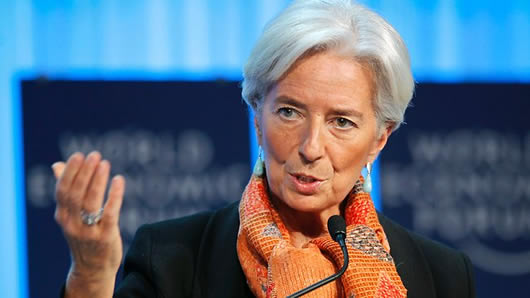
Christine Lagarde – Managing Director of IMF
The International Monetary Fund (IMF) has lauded government’s efforts to pursue a faster fiscal deficit reduction strategy underpinned by a number of structural reforms as contained in the 2015 budget statement presented to Parliament last week.
The Washington-based institution’s commendation of government’s effort came after a team from the Fund, led by Mr. Joël Toujas-Bernaté, visited the country to hold discussions with government authorities on possible IMF economic and financial support.
The Mission said in a statement that it had made significant progress in a third round of talks with Ghana on a financial assistance programme aimed at restoring the country’s fiscal balance, and that it will carry on working with Ghana on an array of measures and then agree on an assistance programme.
“The IMF team will continue to support the authorities as they work in the coming weeks on several areas, including taking concrete steps in cleaning up the payroll; finalising the remaining details of their medium-term reforms; and seeking external financing assurances from bilateral donors and international institutions.
Once this work is completed, a financial arrangement to support Ghana’s economic programme will be agreed at staff level before being proposed for the IMF Executive Board’s consideration,” the statement said
The Finance Minister in last Wednesday’s budget statement, said government’s fiscal policy will be driven mainly by new tax policy measures, revenue administration reforms, improved public financial management, expenditure rationalisation, and the implementation of new debt management strategies.
“The mission in particular welcomes the government’s 2015 budget presented to Parliament last week, which targets a reduction of the fiscal deficit by 3.5 percentage points of GDP (on a commitment basis). With projected arrears repayments of 1.2 percent of GDP next year, the cash deficit will be equivalent to 6.5 percent of GDP in 2015, down from 9.5 percent in 2014,” a statement issued by the IMF said.
The budget, according to the Fund, contains important measures that will boost revenues, eliminate distortive and inefficient energy subsidies, and contain growth in Ghana’s comparatively high public wage bill.
Announcing measures to contain the stubborn wage bill, Finance Minister Seth Terkper warned workers that as part of measures to contain wage expenditure, wage negotiations will be done within the budgetary constraints to ensure sustainability of the Single Spine.
As much as the Fund lauds the efforts initiated by government to tame the wage bill, it wants the measures to be pursued “swiftly”.
“These efforts, together with the implementation of appropriate pay and hiring policies, will help further control the wage bill, which has been a significant source of fiscal risk,” the Fund said.
The mission praised government’s efforts to implement structural reforms to underpin a sustained consolidation toward the 3.5 percent fiscal deficit objective by 2017.
Reforms will include strengthening public finance management, reducing tax exemptions, enhancing tax administration and reviewing the earmarking of revenues for statutory funds.
Key among government’s efforts at boosting the tax revenues is the introduction of 17.5 percent petroleum tax; implementation of the VAT on fee-based financial services among other new tax revenue streams will boost significantly its tax revenues — which is a 31 percent increase over that projected for 2014.
Government’s total tax revenue for next year is estimated at GH¢25.4billion, representing 18.8 percent of GDP.
Also, to reduce tax expenditure which constituted a significant proportion of total tax revenue (13.1 percent) and GDP (2.1 percent) last year, government will abolish of the VAT Relief Purchase Order (VRPO) in granting of relief.
Addressing Parliament on Wednesday, Mr. Terkper added that tax exemptions granted in loan agreements will also be reviewed to reduce the scope of exemptions granted, and the use of special permits will be drastically reduced.
“Taken together, these fiscal measures — combined with sound debt management and actions to further boost effectiveness of the Bank of Ghana’s inflation-targetting framework — should help restore macroeconomic stability,” the Fund said.
The mission, which was in the country from November 6-20, met with President Mahama; Vice-President Kwesi Amissah-Arthur; Dr. Kwesi Botchwey, Chairman of the National Development Planning Commission; Finance Minister Seth Terkper; Bank of Ghana Governor Kofi Wampah; the Finance Committee of the Parliament, other senior officials, and representatives of the private sector, the donor community and civil society.
Source: B&FT























